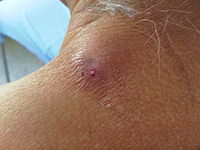
Photo from wikipedia
ETHNOPHARMACOLOGICAL RELEVANCE Eugenia punicifolia (Kunth) DC. (Myrtaceae), an Amazonian medicinal plant known as "pedra-ume-caá," is popularly used as a natural remedy for inflammation, wounds, infections, diabetes, fever, and flu. Its… Click to show full abstract
ETHNOPHARMACOLOGICAL RELEVANCE Eugenia punicifolia (Kunth) DC. (Myrtaceae), an Amazonian medicinal plant known as "pedra-ume-caá," is popularly used as a natural remedy for inflammation, wounds, infections, diabetes, fever, and flu. Its anti-inflammatory, antinociceptive, and gastroprotective effects have already been characterized. We evaluated the gastric healing effect of the hydroalcoholic extract of the leaves of E. punicifolia (HEEP) in male and female Wistar rats against nonsteroidal anti-inflammatory drugs (NSAIDs) and ethanol. MATERIALS AND METHODS The healing effect of HEEP on the gastric mucosa of adult male and female Wistar rats was measured after the chronic application of aggressive factors such as NSAIDs or 80% ethanol. Male, and intact and ovariectomized (OVZ) female rats were treated with HEEP for two days (NSAIDs) or one, two, four, and six days (80% ethanol). The stomachs were analyzed macroscopically for ulcerative lesions (mm2), and the healing process was measured using biochemical analysis with anti-inflammatory and antioxidant parameters. RESULTS Macroscopic evaluation of the gastric mucosa showed that gastric lesions induced by NSAIDs were significantly healed (66%) and pro-inflammatory interleukin 5 cytokine level was decreased after two-day oral treatment with HEEP compared with those in the negative control group (p < 0.05). However, the gastric lesions induced by NSAIDs did not heal in HEEP-treated female rats (p > 0.05). In addition, four-day treatment with HEEP significantly healed the gastric lesions induced by ethanol in male and female rats (63% and 78%, respectively) compared to those of the negative control group (p < 0.05). However, the OVZ group required six days of HEEP treatment to heal gastric ulcers (67% compared to the control group). HEEP exerts the healing effect against ethanol by significantly reducing neutrophil infiltration into the gastric mucosa by decreasing myeloperoxidase activity in male and OVZ rats after four and six days of treatment, respectively (p < 0.05). Four-day treatment with HEEP also increased the level of a non-enzymatic antioxidant, reduced glutathione in intact females compared to that of the negative control group (p < 0.05). CONCLUSION These findings indicated that HEEP was effective in promoting the healing of gastric ulcers induced by NSAIDs or ethanol. The gastric healing effects of this extract could be affected by female sex hormone interference; in future, comprehensive studies should be performed by considering sex differences.
Journal Title: Journal of ethnopharmacology
Year Published: 2019
Link to full text (if available)
Share on Social Media: Sign Up to like & get
recommendations!